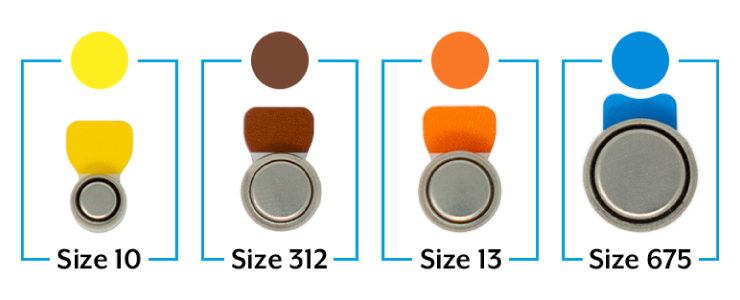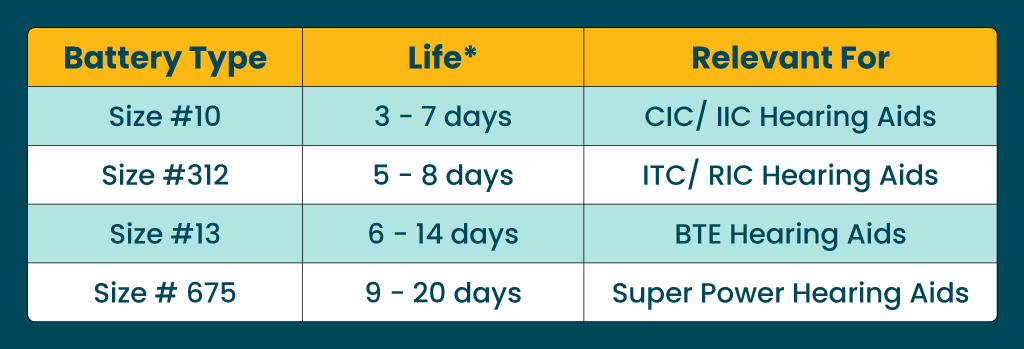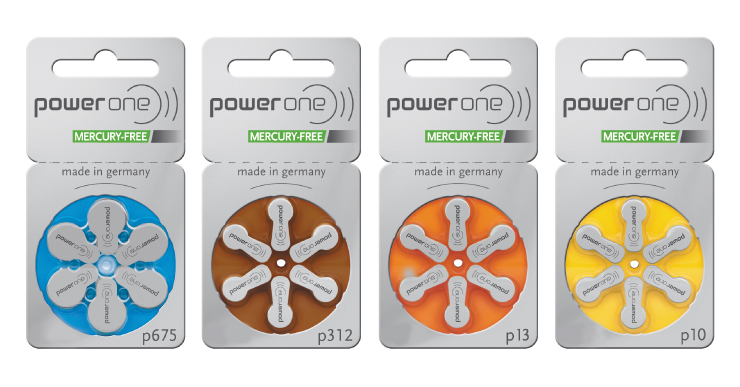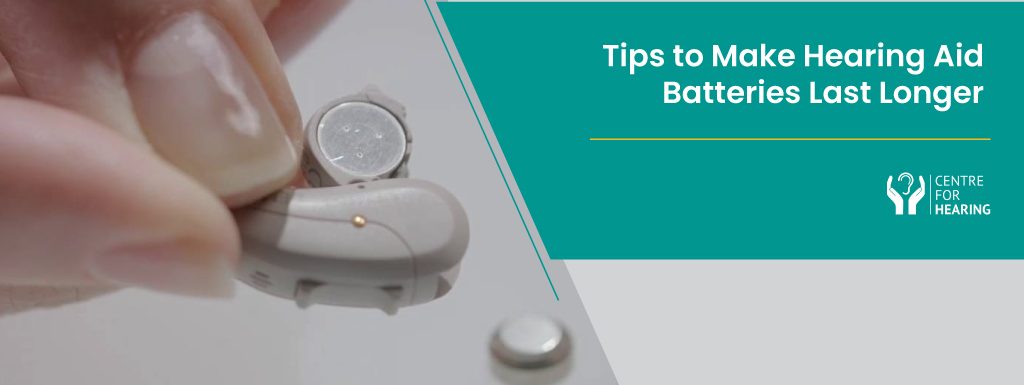Over the years, hearing aids have improved the lives of millions of people across the globe. And, with the advancement of technology they now are available in various designs to cater to the needs of different people.
Broadly, they can be categorised into Behind-the-ear and Inside-the-ear styles. Like any device or technology, hearing aids also need power to work. Most of these devices use button batteries that come in 4 different sizes i.e. Size 10, Size 13, Size 312, and Size 675.
Hearing aid batteries typically last for about 3 to 20 days. Though we consider battery life determined by the size of the battery, there are other factors that determine their life:


* Other factors defining battery life are usage per day, usage of battery draining features (such as bluetooth and streaming), and time spent in noisy situations
Like every electronic gadget, a hearing aid is no good without a working pair of batteries. But these devices have also evolved with technology, and now we have two types of power sources for hearing aids:
- Disposable Batteries: Disposable batteries are the most common ones because of their wider availability and affordability. They come in all relevant sizes and are compatible with every type of device.
- Rechargeable Hearing Aids: The newer Rechargeable type of hearing aids are becoming increasingly popular because of their ease of use and no recurring costs.
Learn about rechargeable hearing aids.
To find the ways to improve battery life, let us first understand the reasons they don’t work up to your expectations.
Here’s how to change the batteries:
Why Are My Hearing Aid Batteries Not Lasting Long?
There can be many-many reasons why your batteries are draining sooner than expected. The most common one, however, is moisture. The batteries can get exhausted when exposed to moisture. It could be because you live in a place with a humid climate, it may catch the moisture in the air or from the resultant perspiration. The dampness clogs the vent in the hearing aid leading it not to function accurately.
Like all the things that come with a dos and don’ts list, there are a few things to keep in mind while using hearing aid batteries. These small changes in the way you use hearing aids and the batteries will surely help improve their performance.
Tips To Increase The Life Of Your Hearing Aid Batteries
Extending the battery life of your hearing aid is more of a habit than a trick. If you successfully build these habits listed below and include them in your daily routine, you will save a good amount of money over the span of some months or years. It will also save you some time and the effort of going back and forth to the store or ordering online. Who doesn’t like that?
Tip #1. Ideal Storing Conditions and Environment:
The environment can play a very important role in extending or decreasing the life of any battery. It’s very important to store batteries in dry and corrosion-free areas. The batteries must not be stored in a damp area when you are not wearing your hearing aids. The optimal temperature is room temperature. Your bedside table is just the right place.

Tip # 2. Leave your batteries open:
It is recommended to leave your zinc-air batteries open after removing them from the strip and removing the sticker. Only insert the battery into the battery drawer after 2 minutes of removing the sticker. This can increase the life of your batteries by 10-15%.
Tip # 3. Use a Hearing Aid Dehumidifier/Dryer:
A Hearing Aid dehumidifier/dryer is a device that absorbs all the excess moisture from your hearing aid and helps in extending its life.
Once you take off the hearing aids for the night and go to sleep, place them in a dehumidifier.
Tip # 4. Measures For Unused Batteries:
It’s best to keep your fresh batteries in their sealed package. Once they get exposed to air, the chemicals in the battery start reacting, making it drain faster. You can try sealing the packet again, however, it won’t necessarily be helpful.
Tip # 5. Keep Away From Dust And Dirt:
Like any other electronic device, hearing aids are prone to damage from dust and dirt. This might impact the performance of the device or even corrode the batteries in some cases. Thus, while replacing the batteries one must always wash their hands with soap and completely dry them with a clean towel.
Tip # 6. Avoid Buying Hearing Aid Batteries in Bulk
It is okay and advised to always have 1-2 extra pairs of batteries with you, in case of an emergency. However, it is not wise to stock them. On average, the expiry date of an unopened hearing aid battery is three-four years. But, the power of an unopened battery reduces with each passing year.
Tip # 7. Proper Daily Maintenance:
You should follow proper daily cleaning and maintenance practices. This prevents the deposit of excess dirt and moisture. Experts recommend that it is better to leave the battery holder open when not using the hearing aids. It gives a channel for the excess air and moisture trapped inside the hearing aid to pass. Secondly, if you are planning not to wear your hearing aids over a longer period, take out the batteries to avoid standby drain.
If you use hearing aids, there is no replacement for the tedious job of changing the batteries regularly. These are some tricks and hacks that we have learned over the years. We hope this is useful for you in saving some time and money.
Whenever you have any doubts or questions regarding your hearing aid or hearing aid batteries, make sure to consult a proper audiologist. Centre For Hearing is an audiology cum Hearing Aid Centre, with the aim to promote awareness on Hearing Aids. We have branches in Delhi, Gurgaon, Mumbai, Chandigarh Tricity Area, and Punjab.
There is never a wrong question that you can ask to ease your hearing difficulty.
Locate a Hearing Aids Centre Near You:

